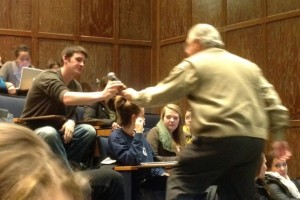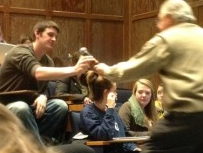Beauty is “not easy to understand or discover,” but it is objective, philosophy professor Mathew Lu argued in “Can Beauty Be Objective” talk Tuesday.
Lu’s talk was part of St. Thomas’ ongoing philosophy colloquia.

Senior Matt Keliher said he came to the talk and disagreed with the ideas in the talk.
“It just seems to me that beauty is something subjective to each individual,” Keliher said. “I don’t see how it can be objective and be defined by one broad definition.”
Lu started the talk by dismantling several arguments in favor of beauty’s subjectivity.
The first argument Lu rejected was what he called “the argument from disagreement.”
“People strongly disagree about what they find beautiful,” Lu said. “When you ask, ‘What is beauty?’ You get all kinds of different answers.”
Lu said many non-philosophers believe that beauty is subjective. If people disagree about what beauty is, it is impossible for there to be a universal truth defining it. Lu, however, said the disagreements can easily be explained.
“There are other possible explanations for why people might disagree,” Lu said. “Some or all the parties in the disagreement might be simply mistaken.”
From this, Lu drew the conclusion that the argument from disagreement failed, and he moved on to the second argument against the objectivity of beauty: non-cognitivism.
The argument for non-cognitivism states there are no knowable facts regarding beauty and that judgments about beauty are not rational.
“When we utter propositions involving value predicates … we are not doing the same kind of thing as when we utter propositions involving what I’ll call factual predicates,” Lu said. “This means that when a person says something is beautiful they are not saying the same kind of thing as when they say something is 12 inches long.”
This argument is incorrect, Lu said, because if you replaced expressions of beauty, such as “that is beautiful,” with expressions of emotion, the argument would make no sense.
At the end of his speech, Lu concluded that beauty is objective, but “that doesn’t mean beauty is easy to understand or discover.”
Freshman Stephanie Appleby said the talk motivated her to think more about the idea of beauty.
“It was really interesting,” Appleby said. “I’ve gone to art museums and stuff like that, but I haven’t really contemplated (beauty) much. He served some really good points.”
Grace Pastoor can be reached at past6138@stthomas.edu.



